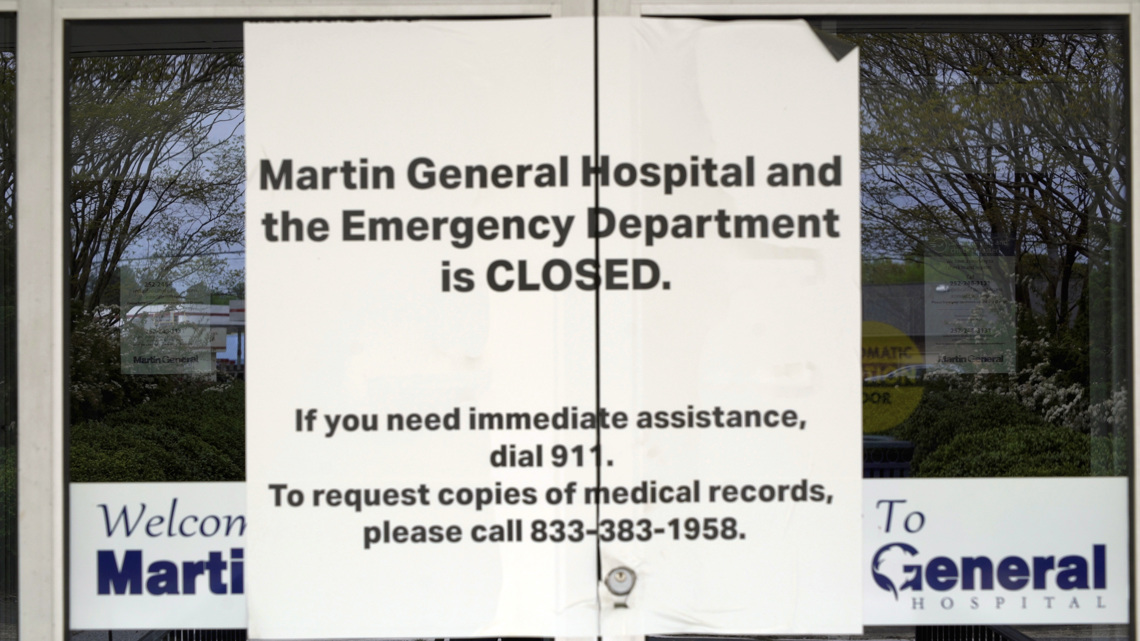A third of Texas’ 157 rural hospitals have less than 10 days’ cash on hand, said John Henderson, Texas Organization of Rural & Community Hospitals.
DALLAS — Democrats warn that at least 15 rural hospitals in Texas are at risk of closing if President Trump’s “Big, Beautiful Bill” passes in the U.S. Senate.
“Our rural hospitals are hanging on by a thread — and Trump and his MAGA lackeys are standing by with scissors to finish the job,” said Ken Martin, chairman of the Democratic National Committee. “Democrats will keep fighting for rural Americans and their way of life and defend their health care from anyone who wants to take it away.”
In a letter to President Trump, Senate Majority Leader John Thune and House Speaker Mike Johnson, Senate Democrats cited hospital data from the Cecil G. Sheps Center for Health Services Research at the University of North Carolina that said 338 rural hospitals — including at least 15 in Texas — are at risk of closing if the legislation passes because the facilities have experienced either three years of unprofitability or they serve a disproportionately high share of Medicaid patients.
Kentucky had the highest number of hospitals at risk, with 35. Louisiana was second with 33.
“Rural hospitals are scared and getting attention because our operating margins are so thin,” said John Henderson, President and CEO of Texas Organization of Rural and Community Hospitals. “44% of rural Texas hospitals had negative margins in 2023. We will be the first provider type to feel the effects.”
Texas has 157 rural hospitals, Henderson added, and one-third of them have less than 10 days’ cash on hand.
The Republican spending bill that the U.S. Senate is now considering will cut Medicaid spending by $785 billion over a decade. The House of Representatives already approved it.
The Medicaid cuts would be used in part to offset the costs of extending President Trump’s 2017 tax cuts.
WFAA contacted the 15 Texas hospitals listed in the UNC study that Democrats cited. They all acknowledged the tight financial conditions under which rural hospitals operate, but none of the facilities said they were on the precipice of closure.
Covenant hospitals in Plainview and Levelland, Texas — near Lubbock — are two of the 15 on the UNC list.
“If the One Big, Beautiful Bill Act is enacted, as proposed by the U.S. House, we anticipate our Medicaid reimbursement would decline by $1.5 billion over the next five years,” a Providence spokesperson said in an emailed statement to WFAA. “Although none of our hospitals listed in the Cecil G. Sheps Center for Health Services Research are at immediate risk of closure, Providence is evaluating all aspects of its operations to ensure our health system remains sustainable and can continue to provide high-quality, affordable care for years to come,” said a Providence spokesperson in an emailed statement to WFAA.
Palacios Community Medical Center, Mid Coast Medical Center — Central in Llano, and El Campo Memorial Hospital also made the list.
The CEO of their parent company, Mid Coast Health System, said the state legislature recognizes the situation with rural healthcare and just approved legislation to assist.
“The State of Texas has approved plans that are with the governor to sign that will assist rural hospitals to improve Medicaid reimbursements. Rural healthcare has and continues to be a challenge, but our local hospital tax districts and other programs provide us with support to offset a lot of those challenges,” said Brett Kirkham, CEO of Mid Coast Health System.
Still, the UNC data states that 21 rural hospitals in Texas have already closed since 2010.


The American Hospital Association says Medicaid is critical to rural hospitals.
The AHA said Medicaid covers more than 16 million people living in rural communities and pays for 47% of rural births in the U.S., along with 65% of nursing home residents.
“Reductions in Medicaid funding will force rural providers to reduce or eliminate essential services or close their doors, limiting access to care for rural residents,” said Alan Morgan, CEO of the National Rural Health Association (NRHA).
Republicans are still debating the bill and have a self-imposed deadline of July 4 to pass it.
